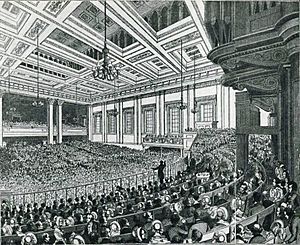Corn Laws facts for kids

The Corn Laws were special rules in the United Kingdom that made it very expensive to bring in grain (like wheat or corn) from other countries. These laws were in place from 1815 to 1846. Their main goal was to help farmers and landowners in Britain make more money by protecting them from cheaper food coming from abroad.
Simply put, the Corn Laws made sure that British landowners earned all the money from farming. It became too costly for anyone to buy grain from other countries. This was a big problem, especially when people in Britain and Ireland needed food, like during times of famine. The laws led to many protests.
The government, led by Robert Peel, eventually got rid of these laws in 1846. However, even after the laws ended, over one million people in Ireland died from starvation between 1846 and 1849. This terrible event is now known as the Irish Potato Famine. The Corn Laws made landowners very rich and powerful. When they were removed, it was a big step towards allowing more free trade around the world.
Why the Corn Laws Started
The idea for the Corn Laws began in 1813. A group in the British Parliament, called the House of Commons, suggested that Britain should stop importing foreign grain until the price of grain grown in Britain went up.
Some people, like the economist Thomas Robert Malthus, thought it was risky for Britain to depend on imported grain. He believed that if food prices were too low, workers' wages would also drop. This would mean that farmers and landowners would have less money to spend, which could hurt businesses.
However, another economist named David Ricardo believed in free trade. He thought Britain should focus on what it was best at producing and trade with other countries. This way, Britain could use its resources and people most effectively.
After a time of peace began in 1814, grain prices started to fall. Because of this, the Tory government, led by Lord Liverpool, passed the first Corn Law in 1815. This new law caused serious riots in London, as many people were unhappy about the high cost of food.
Images for kids
-
Robert Peel became Conservative Prime Minister in 1841, and his government succeeded in repealing the tariffs.
See also
 In Spanish: Leyes de cereales para niños
In Spanish: Leyes de cereales para niños



